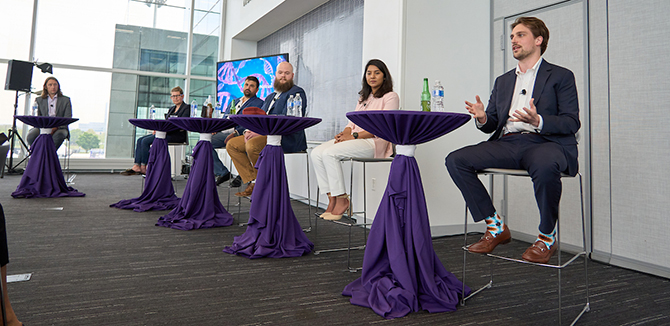A Nexus for Biotech Opportunities
The annual panel and networking event hosted by MBP introduced students to an array of professionals and opportunities that exist within the biotechnology space.

The definition of "nexus" is a connection or series of connections linking two or more items. It was that idea of bringing multiple items together that was at the heart of the creation of Biotech Nexus, an annual event hosted by Northwestern Engineering's Master of Biotechnology Program (MBP).
The event features a panel discussion with industry professionals who leverage biotechnology in a variety of ways, followed by a networking cocktail reception where MBP students interacted and connected with panelists and other industry attendees.
This year's event featured five panelists, including four who are also MBP alumni:
- Matt Barnes (MBP '10) is a client partner within IQVIA’s commercial organization. His responsibility is executive oversight and growth of two of IQVIA’s largest big pharma relationships. He is responsible for more than $50 million in annual revenue across management consulting, data, and software as a service engagements.
- Phillip Freeman (MBP '21) is the process development manager at Clever Carnivore Inc., a Chicago-based cultivated meat company. Freeman leads a team of scientists working to solve the current bottleneck of scaling-up cultivated meat production to reach price parity with traditionally produced meat.
- Paul Marks (MBP '17) is a product specialist at Sartorius covering tangential flow filtration (TFF) consumables and systems. He supports internal technical and sales account managers, as well as working directly with customers in North America. This includes supplying customer interaction and feedback to product management for continuous improvement of membranes and systems.
- Susan Schofer is a partner at SOSV and chief science officer at HAX, a venture program accelerating early-stage hard tech startups. She works with startups to define key milestones and go-to-market strategies, and also is responsible for scientific oversight to support portfolio companies.
- Asha Varghese (MBP '18) is a clinical research project manager at Dallas-based UT Southwestern Medical Center in the department of otolaryngology. She started her career as a benchtop researcher while in MBP before she transitioned to clinical research.
Professor Julius Lucks, who is codirector of the Northwestern Center for Synthetic Biology, moderated the event.
The panelists spoke about their career journeys, and, with the exception of Schofer, how MBP prepared them for what they are doing professionally. Schofer offered a glimpse into life working in venture capital and used her background as a way to demonstrate the array of opportunities that exist within biotech. In addition to being a senior vice president of business development, Schofer spent a decade working in Silicon Valley in research and development, product development, product management, and business development.
She said her current role has been a great way to leverage the knowledge she's gained throughout her career.
"Working in venture capital was really an opportunity to use my skills that I've learned in all these years in startups and try to apply them to a broader swath of different innovations," she said, "and help all these innovators try to bring their companies and technologies to market."
The conversation bounced around to focus on the differences between working in a research lab compared with working for a company, the role artificial intelligence and machine learning is already playing in biotech, and the unique opportunities within the biotech arena. The panelists also discussed what advice they'd give their younger selves and shared tips on how to effectively network with industry professionals like themselves.
The common theme among the four MBP alumni was how the program gave them the breadth and depth of knowledge needed to thrive in an innovative and quickly evolving field.
"MBP gives you a really good opportunity to become a generalist in life sciences," Barnes said. "You're going to understand the entire value chain of R&D and commercialization, and then there will be an opportunity to leverage that and apply it to a suite of different opportunities within biotech."

